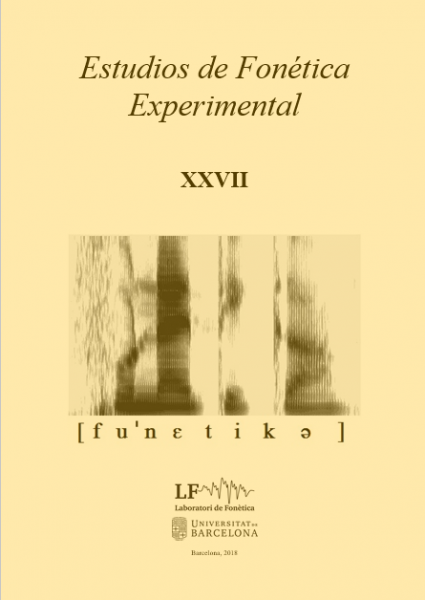JOSEFA DORTA (ED.) (2018): La entonación declarativa e interrogativa en cinco zonas fronterizas del español: Canarias, Cuba, Venezuela, Colombia y San Antonio de Texas, Frankfurt am Main, Peter Lang.
Abstract
To be added.
References
AURREKOETXEA, G.; K. FERNÁNDEZ-AGUIRRE, J. RUBIO, B. RUIZ y J. SÁNCHEZ (2013): «DiaTech: A new tool for dialectology», Literary and Linguistic Computing, 28(1), pp. 23-30.
BECKMAN, M.; M. DÍAZ-CAMPOS, J. T. MCGORY y T. A. MORGAN (2002): «Intonation across Spanish, in the Tones and Break Indices framework», Probus, 14, pp. 9-36.
CONTINI, M.; J. P. LAI, A. ROMANO i S. ROULLET (2003): «Vers un Atlas prosodique des variétés romanes», en Sempre los Camps Auràn Segadas Resurgantas, Mélanges Offerts a Xavier Ravier, Toulouse, CNRS / Université de Toulouse Le Mirail, pp. 73-84.
DORTA, J. (ed.) (2013): Estudio comparativo preliminar de la entonación de Canarias, Cuba y Venezuela, Madrid / Santa Cruz de Tenerife, La Página Ediciones S/L.
ELVIRA-GARCÍA, W.; S. BALOCCO, P. ROSEANO y A. M. FERNÁNDEZ-PLANAS (2018): «ProDis: A dialectometric tool for acoustic prosodic data», Speech Communication, 97, pp. 9-18.
ESTEBAS VILAPLANA, E. y P. PRIETO (2009): «La notación prosódica en español. Una revisión del Sp_ToBI», Estudios de Fonética Experimental, XVIII, pp. 263-83.
FERNÁNDEZ PLANAS, A. M. y MARTÍNEZ CELDRÁN, E. (2003): «El tono fundamental y la duración: dos aspectos de la taxonomía prosódica en dos modalidades de habla (enunciativa e interrogativa) del español», Estudios de Fonética Experimental, XII, pp. 165-200.
GARCÍA RIVERÓN, R. (1976-1977): «Nota para el análisis funcional de la pregunta española comparada con la rusa», Anuario L/L, 7-8, pp. 209-224.
GARCÍA RIVERÓN, R. (1978): «Sobre la conjunción y en la oración interrogativa», Universidad de la Habana, 208, pp. 85-91.
MORA, E. (1996): Caractérisation prosodique de la variation dialectale de l’éspagnol parlé au Venezuela, tesis doctoral, Université d’Aix-en-Provence.
NAVARRO TOMÁS, T. (1944): Manual de entonación española, New York, Hispanic Institute in the United States.
OBREGÓN MUÑOZ, H. (1981): Hacia el estudio de la entonación dialectal del español de Venezuela, Maracay, Instituto Universitario Pedagógico Experimental de Maracay.
PIERREHUMBERT, J. B. (1980): The Phonetics and Phonology of English Intonation, tesis doctoral, Massachusetts Institute of Technology.
PRIETO, P. y P. ROSEANO (eds.) (2010): Transcription of Intonation of the Spanish Language, München, Lincom.
QUILIS, A. (1981): Fonética acústica de la lengua española, Madrid, Gredos.
QUILIS, A. (1989): «La entonación de Gran Canaria en el marco de la entonación española», Lingüística Española Actual, XI, pp. 55-87.
QUILIS, A. (1993): Tratado de fonología y fonética españolas, Madrid: Gredos.
ROSEANO, P.; W. ELVIRA-GARCÍA y A. M. FERNÁNDEZ PLANAS (2017): «Calcu-Dista: A tool for dialectometric analysis of intonational variation», Revista de Lingüística Teórica y Aplicada, 55(2), pp. 63-86.
STOCKWELL, R. P.; D. J. BOWEN e I. SILVA FUENLIZADA (1956): «Spanish juncture and intonation», Language, 32(4), pp. 641-665.
VELÁSQUEZ UPEGUI, E. P. (2013): Entonación del español hablado en Colombia, tesis doctoral, El Colegio de México
Downloads
Published
How to Cite
Issue
Section
License

This work is licensed under a Creative Commons Attribution-NonCommercial-NoDerivatives 4.0 International License.
All articles published online by Estudios de Fonética Experimental are licensed under Creative Commons Attribution-NonCommercial-NoDerivs 4.0 International (CC BY-NC-ND 4.0 DEED), unless otherwise noted. Estudios de Fonética Experimental is an open access journal. Estudios de Fonética Experimental is hosted by RCUB (Revistes Científiques de la Universitat de Barcelona), powered by Open Journal Systems (OJS) software. The copyright is not transferred to the journal: authors hold the copyright and publishing rights without restrictions. The author is free to use and distribute pre and post-prints versions of his/her article. However, preprint versions are regarded as a work-in-progress version used as internal communication with the authors, and we prefer to share postprint versions.




